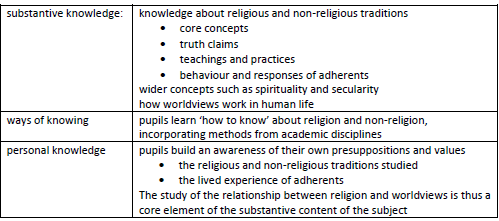Religious Education
The law specifies Religious Education must be taught in all schools, although it is not a part of the national curriculum.
Our curriculum is based on a creative, open-ended enquiry approach using the Discovery RE scheme of work. Our curriculum content has been chosen and adapted to closely adhere to the local agreed syllabus for Peterborough, taking into account the number of faiths and those without religion recorded on roll. It aims to enable children to build their knowledge and skills towards becoming religiously literate for the 21st Century.
Our pupils have positive attitudes of respect towards other people who hold views and beliefs different from their own. They tell us:
“ Religions are important as it makes people unique and special. You might have a friend who is a Muslim, a Christian, a Hindu or a Sikh in your class so you can learn about their religion”
“ RE is important as it’s good to learn about other people’s traditions… and we understand their differences”
“ It’s nice to find out what others believe in, so we can respect them and ask questions which are appropriate, so we can learn from each other.”
Throughout our RE curriculum pupils are encouraged to explore religions and world views, engage with their knowledge, and reflect on their learning and their lives.
Curriculum Intent:
The curriculum enables children to:
- Acquire and develop knowledge and understanding of Christianity and the other principal religions represented in the United Kingdom.
- Develop an understanding of the influence of beliefs, values and traditions of individuals, communities, societies and cultures
- Develop positive attitudes of respect towards other people who hold views and beliefs different from their own; living in a society of diverse religions
- Develop the ability to make reasoned and informed judgements about religious issues, with reference to the teachings of the principal religions represented in Peterborough and the United Kingdom
- Enhance their spiritual, moral, social and cultural development by: Developing awareness of the fundamental questions raised by human experiences and of how religious teachings can relate to them.
- Respond to such questions with reference to the teachings and practices of religions and other belief systems, relating them to their own understanding and experience
- Reflect on their own beliefs, values and experiences in the light of their study.
How it is taught
Currently, RE is taught as a mixture of weekly hour-long lessons with some RE days in KS1 and learning days in KS2. RE is taught for 45 hours in KS2 and 36 hours in KS1 and meets the statutory hours for the Peterborough agreed syllabus.
Lessons take children on a learning journey from their own world to a world of religion and belief, learning about aspects of that religion in order to offer answers to a big enquiry question, and then close with an opportunity to express their own opinions and learning.
In addition to this, all pupils visit a church or Peterborough Cathedral as well as other religious buildings of other faiths. Visitors from different faiths and world views are invited into assemblies and classrooms. Sometimes virtual tours and resources are used to enrich the curriculum.
How we ensure progression
Progression is a key element throughout the curriculum with well sequenced units of work that build on previous knowledge that allow for pupils own personal knowledge to be explored. Progression runs from Reception through Key Stage 1 to the end of Key Stage 2. Well sequenced units from the scheme of work (Discovery RE) explore key concepts about religion and world views allowing pupils to explore the similarities and differences and thus avoiding misconceptions and stereo typing.
The chosen units in our curriculum reflect the three types of knowledge as defined by Ofsted.

Reception/Early Years
Religious Education (RE) in Early Years allows exploration of the world and responds to children’s natural curiosity about things around them. Using a multi-sensory approach, lessons provide opportunities for pupils to learn and understand about themselves, others (personal and social development) and the world (knowledge and understanding of the world) and to develop pupils’ abilities to express themselves (communication, language and literacy, creative development). Our RE curriculum matches coverage of the Prime Areas in EYFS. Through knowledge, skills and understanding, pupils develop positive attitudes towards other people and their right to hold different beliefs. Pupils begin:
- to identify their own uniqueness and that of others;
- to appreciate the differences and similarities, they encounter in others;
Stories are used to begin to understand what faith and belief means.
Key Stage 1 (KS1)
KS1 progresses directly from what has been taught in early years. Pupils begin to be introduced to the concepts of religion, beliefs and world views, through studying the different religions separately. Religions are learnt in chronological order (Judaism, Christianity, Islam, Hinduism with Sikhism followed by Buddhism), so pupils do not encounter misconceptions about events and people in the different religions and world views.
Key Stage 2 (KS2)
KS2 progresses directly from KS1 and explores the same concepts but in greater depth. Pupils will begin to follow use philosophical and theological principles and start to use these in their discussions regarding religion and world views. They also explore the historical starting points for each religion and world view so are then able to put this into context with the ‘ways of knowing’. The curriculum is a mixture of studying religions separately and as part of thematic units, so pupils are able to compare similarities and differences.
Assessment
There are 2 assessment foci for RE which can be summarised as learning about religion and learning from religion.
PT1 – Knowledge and understanding of religion and world views
Enquiring into, investigating and understanding religions and beliefs. This includes thinking about and interpreting religious beliefs, teachings, sources, practices, ways of life, and ways of expressing meaning with reference to the specific beliefs and religions studied.
PT2 – Responding to religion and world views
Questioning, exploring, reflecting upon and interpreting human experience in the light of religions and beliefs studied. This includes communicating reflections, responses and evaluations about questions of identity, belonging, diversity, meaning, purpose, truth, values, and commitments making increasingly insightful links to the specific religions studied.
These are assessed by the teacher and the pupil at the end of each unit of work using a sequence of steps linked to an enquiry question. Pupils may be working towards, working at or working beyond Year group expectations. Outcomes for learning are recorded in children’s topic books. End of Year outcomes are based on the Primary Assessment statements and foci above from the Peterborough RE syllabus details of which can be found through the links.
Collective Worship
All state-funded schools are required to provide a daily act of collective worship for pupils aged between 5 to 18 years, through legislation. This is in addition to the statutory hours of RE. Our collective worship takes the form of whole school, key stage and class assemblies mapped to a variety of religious festivals and customs from around the world across the year.
The right to withdraw from RE
Parental right of withdrawal from RE was first granted in 1944 when curricular RE was called ‘Religious Instruction’ and, as such, had connotations of induction into the Christian faith. RE is very different now. It takes account of world faiths and non-religious world views so that children can learn about and from religious traditions without being inducted into those traditions.
In England, parents and carers have the right to withdraw their children from RE. This right of withdrawal exists for all pupils in all types of school, including schools with and without a religious designation. Parents and carers also have the right to withdraw their child from part of RE and can do so without giving any explanation.
Where a pupil has been withdrawn, the law provides for alternative arrangements to be made for RE by the parent (Section 71(3) of the School Standards and Framework Act 1998).
We kindly ask parents considering withdrawal to contact the head teacher to arrange a discussion.
Any applications for withdrawal should be made in writing to Mrs I Wrigley (Head teacher)
